| Listing 1 - 6 of 6 |
Sort by
|
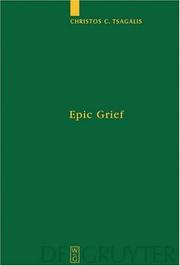
ISBN: 3110896257 311017944X 9783110896251 9783110179446 Year: 2004 Volume: Bd. 70 Publisher: Berlin ; New York Walter de Gruyter
Abstract | Keywords | Export | Availability | Bookmark
 Loading...
Loading...Choose an application
- Reference Manager
- EndNote
- RefWorks (Direct export to RefWorks)
Den poetischen Techniken der Klagerede in Homers Ilias wird hier erstmals eine eigene Untersuchung gewidmet. Die Klagerede ist, wie diese Arbeit nachweist, eine eigene Untergattung, die in der Ilias aus der Gattung der Grabrede hervorgegangen ist. Oralitätsforschung, Narratologie, Semiotik und rhetorische Analyse werden geschickt genutzt um zu untersuchen, auf welche Weise die persönlichen Klagen grundlegende ethische Themen entwickeln und Erzählfäden entwirren, die in das thematische Geflecht der ganzen Ilias (und ihres weiteren Zusammenhangs) eingesponnen sind: Achills Zorn, der Tod von Patroklos und Hektor, Achills Trauer und sein bevorstehender Tod, die Vorahnung von Trojas Zerstörung. Ausgezeichnet mit dem "Annual Award in Classics" (2007) der Akademie von Athen. This study of the gooi or personal laments in Homer´s Iliad once and for all articulates the poetic techniques regulating this type of speech. Going beyond the tendency to view lament as a repetitive and group-based activity, this work shows instead the primacy of the goos, a sub-genre which the Iliad has "produced" by absorbing the funerary genre of lament. Oral theory, narratology, semiotics, rhetorical analysis are deftly applied to explore the ways personal laments develop principal epic themes and unravel narrative threads weaving the thematical texture of the entire Iliad (and beyond): the wrath of Achilles, the deaths of Patroclus and Hector, the grief of Achilles and his future death, the foreshadowing of Troy´s destruction. Winner of the Annual Award in Classics (2007) of the Academy of Athens.
Grief in literature. --- Homer. -- Iliad. --- Grief in literature --- Languages & Literatures --- Greek & Latin Languages & Literatures --- Homer. --- Chagrin dans la littérature --- Verdriet in de literatuur --- Homer
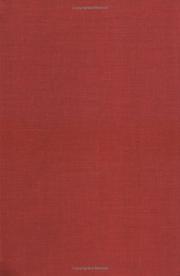
ISBN: 031229381X 0312293828 Year: 2003 Publisher: New York ; Houndmills Palgrave Macmillan
Abstract | Keywords | Export | Availability | Bookmark
 Loading...
Loading...Choose an application
- Reference Manager
- EndNote
- RefWorks (Direct export to RefWorks)
Chagrin dans la littérature --- Grief in literature --- Rôle selon le sexe dans la littérature --- Seksuele rolpatronen in de literatuur --- Sex role in literature --- Verdriet in de literatuur --- Grief in literature. --- Literature, Medieval --- Sex role in literature. --- History and criticism. --- Literature [Medieval ] --- History and criticism
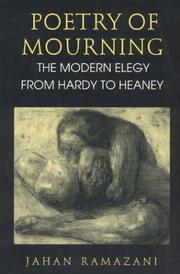
ISBN: 0226703398 0226703401 9780226703404 Year: 1994 Publisher: Chicago London University of Chicago Press
Abstract | Keywords | Export | Availability | Bookmark
 Loading...
Loading...Choose an application
- Reference Manager
- EndNote
- RefWorks (Direct export to RefWorks)
Called the "mother of beauty" by Wallace Stevens, death has been perhaps the favorite muse of modern poets. From Langston Hughes's lynch poems to Sylvia Plath's father elegies, modern poetry has tried to find a language of mourning in an age of mass death, religious doubt, and forgotten ritual. For this reason, Jahan Ramazani argues, the elegy, one of the most ancient of poetic genres, has remained one of the most vital to modern poets. Through subtle readings of elegies, self-elegies, war poems, and the blues, Ramazani greatly enriches our critical understanding of a wide range of poets, including Thomas Hardy, Wilfred Owen, Wallace Stevens, Langston Hughes, W. H. Auden, Sylvia Plath, and Seamus Heaney. He also interprets the signal contributions to the American family elegy of Robert Lowell, Allen Ginsberg, Anne Sexton, John Berryman, Adrienne Rich, Michael Harper, and Amy Clampitt. Finally, he suggests analogies between the elegy and other kinds of contemporary mourning art--in particular, the AIDS Memorial Quilt and the Vietnam Veterans Memorial. Grounded in genre theory and in the psychoanalysis of mourning, Ramazani's readings also draw on various historical, formal, and feminist critical approaches. This book will be of interest to anyone concerned with the psychology of mourning or the history of modern poetry. "Consists of full, intelligent and lucid exposition and close reading. . . . 'Poetry of Mourning' is itself a welcome contribution to modern poetry's search for a 'resonant yet credible vocabulary of grief in our time."--'Times Literary Supplement'
Poetry --- English literature --- American literature --- American poetry --- Elegiac poetry, American --- Elegiac poetry, English --- English poetry --- Grief in literature. --- Mourning customs in literature. --- History and criticism. --- English-speaking countries --- Intellectual life --- American elegiac poetry --- Chagrin dans la littérature --- Deuil--Coutumes dans la littérature --- Grief in literature --- Mourning customs in literature --- Rouwgebruiken in de literatuur --- Verdriet in de literatuur --- History and criticism --- 20th century --- Elegiac poetry [English ] --- Elegiac poetry [American ] --- Elegiac poetry, English - History and criticism. --- Elegiac poetry, American - History and criticism.
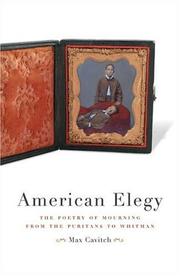
ISBN: 081664893X 9780816648931 9780816648924 0816648921 0816698856 Year: 2007 Publisher: Minneapolis London University of Minnesota Press
Abstract | Keywords | Export | Availability | Bookmark
 Loading...
Loading...Choose an application
- Reference Manager
- EndNote
- RefWorks (Direct export to RefWorks)
Bereavement in literature --- Chagrin dans la littérature --- Death in literature --- Deuil--Coutumes dans la littérature --- Dood in de literatuur --- Grief in literature --- Mort dans la littérature --- Mourning customs in literature --- Rouwgebruiken in de literatuur --- Sterfte in de literatuur --- Verdriet in de literatuur --- Elegiac poetry, American --- American poetry --- Mourning customs in literature. --- Grief in literature. --- Death in literature. --- History and criticism. --- American elegiac poetry --- History and criticism --- Elegiac poetry [American ] --- Emerson, Ralph Waldo --- Criticism and interpretation --- Whitman, Walt --- Wheatley, Phillis --- Lincoln, Abraham
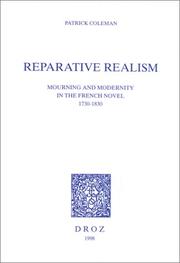
ISBN: 2600002863 Year: 1998 Volume: 370 Publisher: Genève droz
Abstract | Keywords | Export | Availability | Bookmark
 Loading...
Loading...Choose an application
- Reference Manager
- EndNote
- RefWorks (Direct export to RefWorks)
Chagrin dans la littérature --- Grief in literature --- Verdriet in de literatuur --- 840-3 --- 840-31 "17/18" --- French fiction --- -French fiction --- -Grief in literature --- French literature --- Franse literatuur: proza --- Franse literatuur: roman--18e en 19e eeuw. Periode 1700-1899.--(eveneens voor boeken over recht periode 1789-1799) --- History and criticism --- Balzac, Honore de --- Constant, Benjamin --- Prevost abbe --- Rousseau, Jean-Jacques --- Stael Madame de --- 840-31 "17/18" Franse literatuur: roman--18e en 19e eeuw. Periode 1700-1899.--(eveneens voor boeken over recht periode 1789-1799) --- 840-3 Franse literatuur: proza --- Balzac, Honoré de, --- Constant, Benjamin, --- Prévost, --- Rousseau, Jean-Jacques, --- Staël, --- 18th century --- 19th century --- Prévost, Antoine François, called Prévost d'Exilles --- Staël, Madame de , Anne-Louise-Germaine --- Staël, Madame de, (Anne-Louise-Germaine)
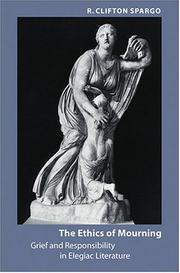
Abstract | Keywords | Export | Availability | Bookmark
 Loading...
Loading...Choose an application
- Reference Manager
- EndNote
- RefWorks (Direct export to RefWorks)
'The Ethics of Mourning' dramatically shifts the critical discussion of the lyric elegy from psychological economy to ethical responsibility. Beginning from a reevaluation of famously inconsolable mourners such as Niobe and Hamlet, R. Clifton Spargo discerns the tendency of all grief to depend at least temporarily upon the refusal of consolation. By disrupting the traditional social and psychological functions of grief, resistant mourners transform mourning into a profoundly ethical act. Spargo finds such examples of ethical mourning in opposition to socially acceptable expressions of grief throughout the English and American elegiac tradition. Drawing on the work of Paul Ricoeur, Bernard Williams, and Emmanuel Levinas, his book explores the ethical dimensions of anti-consolatory grief through astute readings of a wide range of texts -- including treatments of Hamlet, Milton, and Renaissance elegists, extended readings of Dickinson, Shelley, and Hardy, and final chapters on American Holocaust elegies by Sylvia Plath and Randall Jarrell. Spargo argues that, to the extent that elegies are melancholic, to the extent that they resist the history of consolation and the strategies of commemoration implicit in elegiac conventions, they make an extraordinary ethical demand on us, asking that we remain in relationship to the other, even past the point of all usefulness. In the wake of the atrocities of the twentieth century, particularly the Holocaust, Spargo finds the crisis in the project of commemoration to be an event already inscribed with ethical meaning. He argues for the particular capacity of literature to undertake an imaginative risk on behalf of another that seems the very ground of ethics itself.
Bereavement in literature --- Chagrin dans la littérature --- Death in literature --- Deuil--Coutumes dans la littérature --- Dood in de literatuur --- Ethics in literature --- Ethiek in de literatuur --- Ethique dans la littérature --- Grief in literature --- Holocaust [Jewish ] (1939-1945) in literature --- Holocaust [Joodse ] (1939-1945) in de literatuur --- Holocaust juif (1939-1945) dans la littérature --- Loss (Psychology) in literature --- Mort dans la littérature --- Mourning customs in literature --- Perte (Psychologie) dans la littérature --- Rouwgebruiken in de literatuur --- Sterfte in de literatuur --- Verdriet in de literatuur --- Verlies (Psychologie) in de literatuur --- 82-14 --- 82.04 --- Lyriek. Minnezang. Religieuze poëzie. Lied --- Literaire thema's --- American literature --- Bereavement. --- Conduct of life. --- Death in literature. --- Elegiac poetry, American --- Elegiac poetry, English --- Elegiac poetry. --- English literature --- Ethics in literature. --- Ethics. --- Grief in literature. --- Grief. --- Holocaust, Jewish (1939-1945) --- Holocaust, Jewish (1939-1945), in literature. --- Judaism and literature --- Loss (Psychology) in literature. --- Mourning customs in literature. --- History and criticism. --- 82-14 Lyriek. Minnezang. Religieuze poëzie. Lied --- 82.04 Literaire thema's --- Holocaust, Jewish (1939-1945). --- History and criticism --- Elegiac poetry [English ] --- Elegiac poetry [American ] --- English-speaking countries
| Listing 1 - 6 of 6 |
Sort by
|

 Search
Search Feedback
Feedback About UniCat
About UniCat  Help
Help News
News